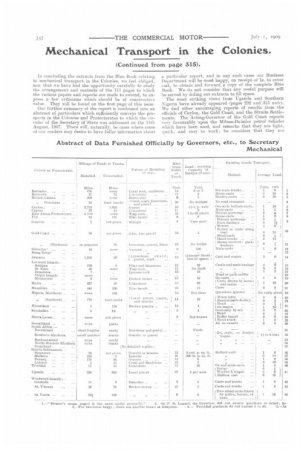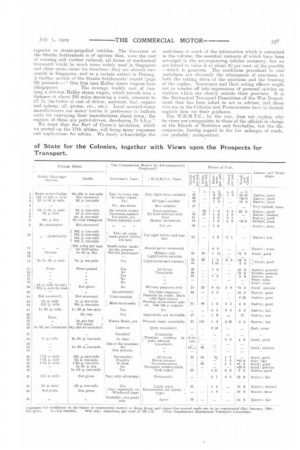Mechanical Transport in the Colonies.
Page 16

Page 17

If you've noticed an error in this article please click here to report it so we can fix it.
(Continued from page 515).
In concluding the extracts from the Blue Bookrelating to mechanical transport in the Colonies, we feel obliged, now that we have had the opportunity carefully to study the arrangement and contents of the 111 pages to which the various papers and reports are made to extend, to express a few criticisms which should he of constructive value. They will be found on the first page of this issue. Our further summary of the report is condensed into an abstract of particulars which sufficiently conveys the prospects in the Colonies and Protectorates to whieh the circular of the Secretary of State was addressed on the lnth August, 1907. There will, naturally, be cases where some of our readers may desire to have fuller information about
a particular report, and in any such cases our Business Department will be most happy, on receipt of is. to cover cost, to obtain and forward a copy of the complete Blue Book. We do not consider that any useful purpose will be served by doling out extracts to fill space. The most striking views from Uganda and Southern Nigeria have already appeared (pages 292 and 315 ante). We find other encouraging reports of results from the officials of Ceylon, the Gold Coast, and the Straits Settlements. The Acting-Governor of the Gold Coast reports very favourably upon the Milnes-Daimler petrol vehicles which have been used, and remarks that they are light, quick, and easy to work: he considers that they are
superior to steam-propelled vehicles. The Governor of the Straits Settlements is of opinion that, were the cost of running still further reduced, all forms of mechanical transport would be much more widely used in Singapore and other areas under his direction : they are already successful in Singapore, and to a certain extent in Penang. A further section of the Straits Settlements report ',page 63) proceeds :-" One firm uses Halley steam wagons here (Singapore). . . . The average weekly cost of running a five-ton Halley steam wagon, which travels over a distance of about 200 miles steaming a week, amounts to £7 7s. (inclusive of cost of driver, assistant, fuel, repairs and upkeep, oil, grease, etc., etc.). Local aerated-water manufacturers use motor lorries in preference to bullock carts for conveying their manufactures about town; the engines of these are petrol-driven, developing 24 b.h.p."
We trust that the Earl of Crewe's invitation, which we quoted on the 17th ultimo, will bring many responses and applications for advice. We freely acknowledge the usefulness oi much of the information which is contained in the volume, the essential contents of which have been arranged in the accompanying tabular summary, but we are forced to value it at about 30 per cent, of the possible -which is generous. The conditions precedent to real usefulness are obviously the attainment of exactness in both the setting & down of the questions and the framing of the replies. Governors and their acting officers ought not to wander off into expressions of personal opinion on matters which are clearly outside their province. It is the Mechanical Transport Committee of the 'War Department that has been asked to act as adviser, and those who are in the Colonies and Protectorates have to furnish explicit data for their guidance.
The W.D.M.T.C., by the way, does not explain why its views are antagonistic to those of the officials in charge at the Islands of Dominica and Seychelles, but the discrepancies, having regard to the low mileages of roads, are probably unimportant.






















